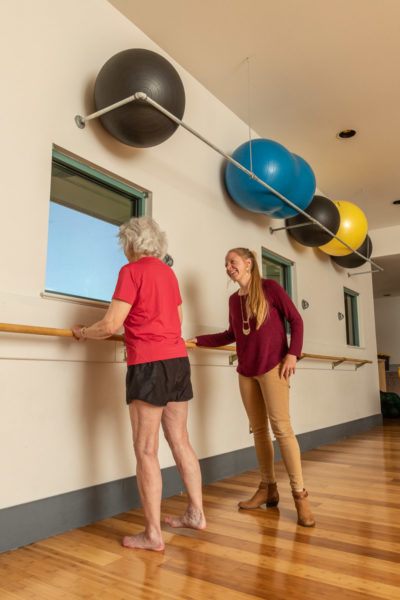Physical Therapy and Heart Health
If you’re trying to improve your heart health, it’s as simple as putting one foot in front of the other.
Perhaps hearing that alone is enough to get you out the door to get on a regular walking routine, but maybe you need just a little more information. Maybe you have some lingering questions.
How fast or hard do I need to walk for it to benefit my heart?
With all of the wearable devices available on the market today, it’s easy to overcomplicate things. A simple and effective way to assess your level of exertion is to use the talk test. You need to walk at a brisk enough pace that you can’t sing, but you can talk. If you can only speak one or two words at a time you are walking too hard, but if you can belt out your favorite song, you need to pick up the pace.
How far or long do my walks need to be to make an impact on heart health?
Recently, on March 1, 2023, the University of Cambridge published an article stating that walking briskly for as little as 75 minutes a week — just 11 minutes a day — can reduce a person’s risk of heart disease, stroke, and cancer.
This is good news for those who are intimidated by the American Heart Association’s (AHA) recommendation of at least 150 minutes (about 2 and a half hours) of moderate-intensity physical activity per week. At half the time, the 75-minute mark came with significant health benefits, researchers concluded, including a 17-percent reduction in the risk of cardiovascular disease. This is a great place to start, and once 75 minutes becomes easily manageable, gradual increases will eventually add up to the full AHA recommendation.

In fact, the AHA recently reported about a new study by the University of Alabama at Birmingham School of Public Health, which found that for every additional 500 steps walked each day by those age 70 and older, the risk for heart disease, stroke and heart failure dropped by 14 percent. For an average person, 500 steps is about ¼ mile, which takes between five and seven minutes.
What if I’m worried about walking?
If walking too far is a safety concern for you then start with 5-10-minute walks within your house and in your yard, around the block, or along a route that you know has places to rest. If you’re unsure walking continuously for 5 minutes is within your abilities at this time, or you have other health concerns such as a cardiac history or fear of falling, a physical therapist can help!

A physical therapist will take your vitals at rest, during exercise, and after exercise to ensure your heart can handle the demands of increased activity. Once your physical therapist determines your activity tolerance, they’ll work with you to create a custom program designed to increase strength and aerobic capacity to ensure a safe progression to prolonged walking.
If you feel like you’re off-balance a lot and starting a walking routine makes you nervous, a physical therapist can work with you to boost your balance. A few simple moves might be all you need to add to your days to increase the strength in muscles that provide you with stability and support, thus reducing your risk of injury. In fact, lack of lower body strength and flexibility is one of four common causes of walking injuries, all of which are preventable.
Is walking enough?
You can walk your way to wellness, all it takes is a commitment to putting one foot in front of the other! For many, starting and sticking to a walking program is the biggest challenge. The thing about challenges is they usually have solutions. You can discover success with movement, and, when it comes to a new exercise routine, you can start small for big change!
Walking is a safe and effective way to not only improve aerobic capacity, but also reduce the risk of heart disease, stroke, and cancer. It’s an ideal form of exercise because you can do it just about anytime, anywhere!
If you need help getting started, a physical therapist can perform an objective assessment to ensure your heart can tolerate the demands of walking, and develop a custom plan, meeting you where you are, to get you moving.

Join us for the AHA Heart & Stroke Walk!
At Therapeutic Associates Physical Therapy, we’re passionate about getting people moving and promoting health and wellness. Our employees from throughout the Pacific Northwest join forces each year to participate in the AHA Heart & Stroke Walk to help fund lifesaving science in the fight against the number one and number five causes of death: heart disease and stroke. We are proud to be among the million+ people in 300+ cities across the country taking a stand against heart disease and would love for you to join one of our teams, not only is it a great way to kickstart your new heart-healthy habit, but you’ll be making an impact for others as well!

Move more, worry less!
As physical therapists, we know the importance of movement for overall health and well-being. Our passion is to help everyone we work with reach their goals and live an active, pain-free life. Get started with physical therapy today!

